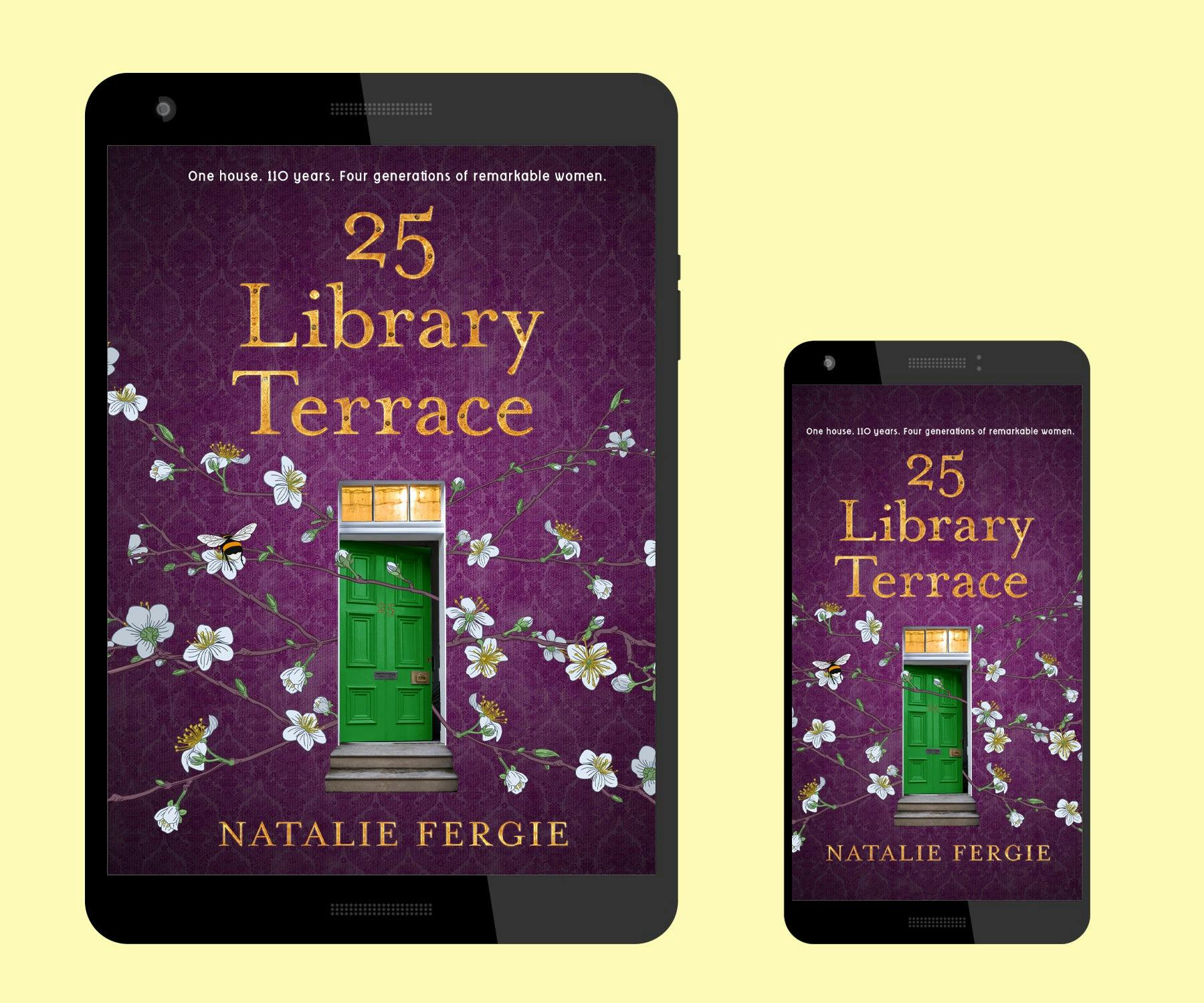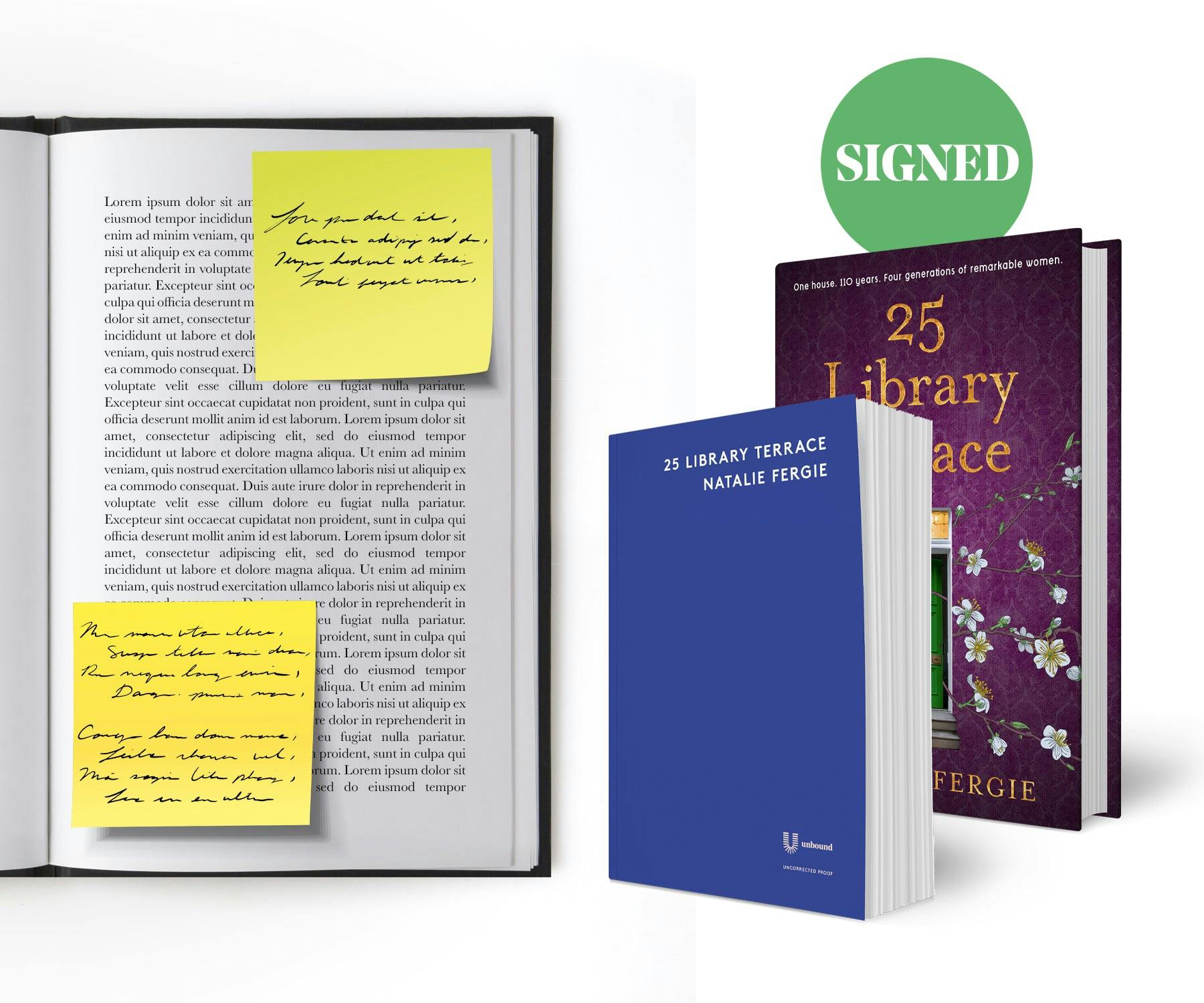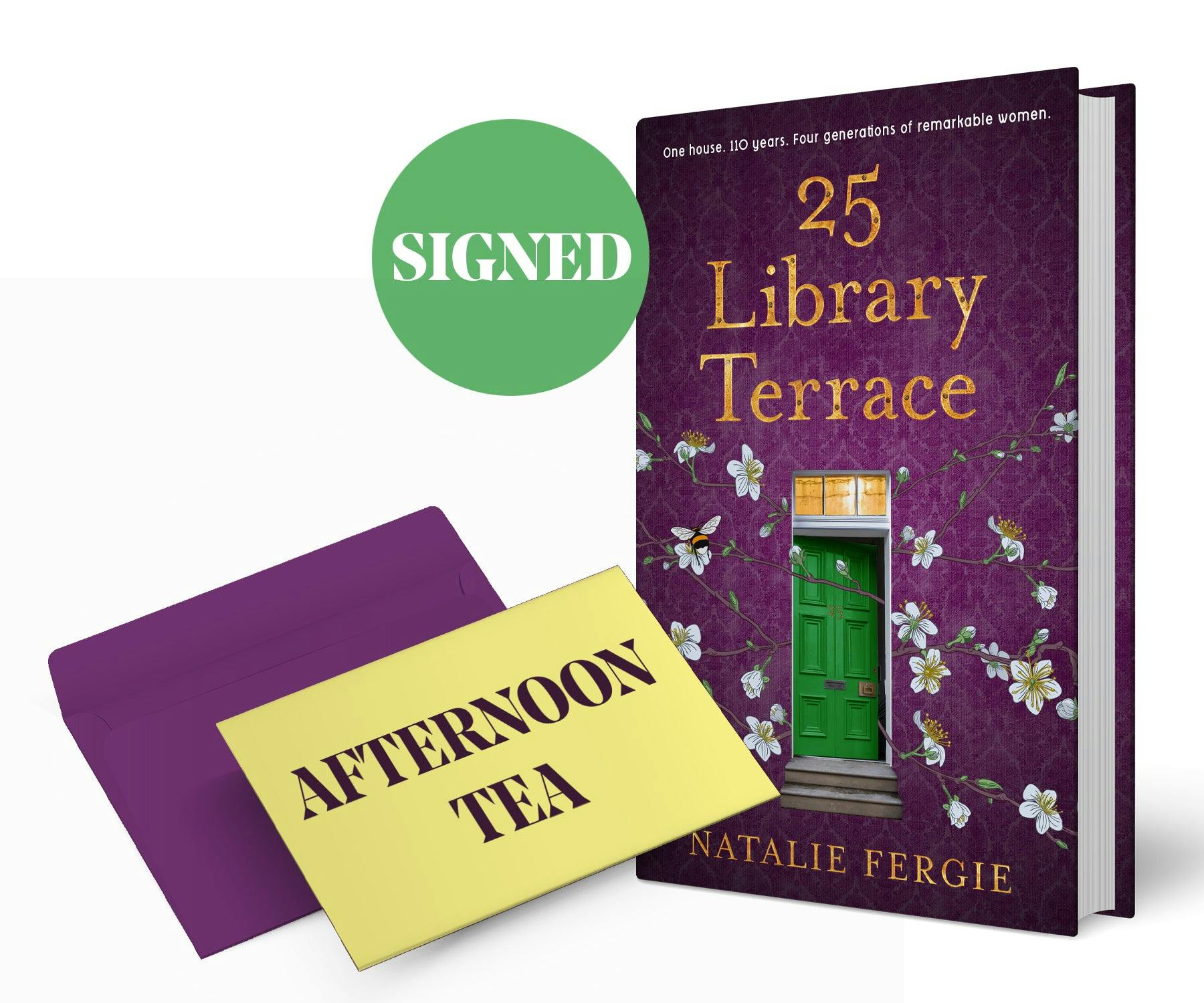
25 Library Terrace is a home in Edinburgh where lives are changed.
In the census year of 1911, Ursula Black takes stock of the social changes happening around her and is determined to transform her world for the better. When the household is supportive of Ursula’s ideas, if a little surprised, she seizes an opportunity to embrace women’s suffrage, vegetarianism and the complicated challenge of building a new family.
Twenty years later, during the Great Depression and after the 1931 census is completed at 25 Library Terrace, a radical suggestion takes root and the house gains a new purpose. Ursula’s ideals are revived, and a startling secret that has been lying dormant is discovered.
In 2011, a century after Ursula Black first moved in, it’s Tess Dutton’s turn to push open the green front door and discover the legacy of this unusual Edinburgh villa that offers a fresh perspective, and fosters truth, trust and fairness.
This is a deeply satisfying novel about strong and determined women who grasp their own destiny and help others to grasp theirs. At its centre is the house, and a reminder that however our lives change over the years, the things that really matter – love, kindness, stories, good recipes – stay the same.
Chapter 3
March 1908
The yell could be heard from the street outside the house.
John Black stopped stroking his moustache and looked up from the papers he was consulting. He screwed up his eyes, trying to see past the piles of masonry and lead pipes lying in what would eventually be his front garden. The yell had become a scream of pain and it was heading in his direction.
A man covered in pale dust appeared at the rectangular opening where the front door would soon hang. Under his well-muscled arm was a bundle of flailing arms and legs. He headed towards a standpipe in the street where he turned the iron tap on and let water flow out across the not-yet cobbled ground. Despite the noisy protests, he knelt down and pushed the young lad’s head under the gush.
‘Keep still! The water has to get into your eye.’ The screaming stopped as the boy spluttered and coughed. Every so often there was a gasp and a shout, but the man was determined to keep the lad’s head under the flow of water. A second boy appeared.
‘Get a pail!’ the man shouted. ‘And make sure it’s empty.’
The boy vanished back inside the house and returned quickly with a heavy galvanised bucket, bashed about the rim.
The injured lad was silent now. He had been set back onto his feet and stood shivering, his chest and head soaking wet, and water dribbling down onto his shirt. The man rinsed the grey bucket out three times and then filled it with fresh water.
‘Sit there’, he instructed, and the lad sat down obediently on a stack of planks. Beside him was a heap of long larch poles and coiled ropes; last week these had been the scaffolding for the house. The man lifted the bucket and put it down next to the boy. ‘You need to take handfuls of water, like this,’ he demonstrated, ‘and then hold your hand against your eye and tip your head back.’
The boy nodded.
‘I want you to use the whole pail of water. And when you’ve done that there will be another pail. Over and over again. Have you got that? Do you understand?’ There were more nods.
All this activity unfurled in front of John Black, who was standing on a rutted path that would soon be the pavement. He unbuttoned his overcoat. ‘Here,’ he said, stepping forward, ‘the boy is freezing cold. Put this around him.’
The plasterer looked up, taking in the smart hat and formal suit. ‘That’s kind of you, sir, but your coat will be ruined.’
‘This is going to be my house, and I think a few marks on a coat is a small price to pay for looking after one of the young men who is building it for me.’ He held the heavy wool coat out, its satin lining catching the winter light. ‘Please, take it.’
The plasterer nodded. ‘Thank you. He’s chilled, that’s for sure.’
‘And his face? What happened?’
‘A dod of lime plaster in his eye. It’s caustic. It will have burned.’
‘In his eye? My God.’
‘I expect he’ll be fine after a few days. We got it rinsed out very quickly. You really can’t delay with this kind of thing.’
‘What age is he? He looks so young.’ John frowned. ‘Is it safe for him to be here?’
‘It’s Saturday so he isn’t at school. He is thirteen,’ the man lied. ‘I pay him, and he takes the wage home to his mother. She’s a widow. It all helps a little.’
John nodded, but was unconvinced. ‘Very well. I’ll leave you to get on. I need to get home now. It’s been rather a day.’
The man hesitated, unsure how to respond.
John crossed his red woollen scarf across his chest and tucked the ends under his arms. He buttoned up his suit jacket. ‘I had thought that this house would be where my wife and I would bring up our family, but according to the doctor we saw this morning, she is quite unwell, and now I am uncertain about almost everything.’ It was somehow easier to tell a complete stranger about his circumstances than it would have been to disclose them to a friend on the golf course.
‘I hope the news is not as bad as you fear, sir.’ The plasterer held out his hand, and John grasped it, feeling the man’s calloused skin against his own office-smooth fingers.
‘Thank you.’ He judged the plasterer to be a similar build to himself. ‘Please just keep the coat. It may be useful to the lad, or to someone else.’
He looked back at the house, noticing for the first time that someone had chalked a 2 and a 5 in large numbers on the stone lintel above the door, and then he turned and picked his way back along the uneven road surface of Library Terrace, rubbing his hands together in the brisk air because his leather gloves were in the pockets of the coat that was no longer his, and it would have been churlish to go back and ask for them.
Finlay and Ann would be waiting for him at home. He had no idea how he was going to tell them the news about their mother.
25 Library Terrace
Natalie Fergie Signed First Edition Bundle£30.00
Signed First Edition Bundle£30.00The first edition hardback, signed by Natalie plus the ebook. Final product may differ from image shown.
 Ebook Download£10.00
Ebook Download£10.00The first edition ebook.
 First Edition Bundle£20.00
First Edition Bundle£20.00The first edition hardback.
 Signed Proof Bundle£55.00Only 10 left
Signed Proof Bundle£55.00Only 10 leftGet to read Natalie’s novel before anyone else - receive a signed, hand-numbered uncorrected proof copy four months before publication, plus a signed first edition hardback (on publication), and the ebook. LIMITED TO 50. Final product may differ from image shown.
Only 10 left Annotated Copy Bundle£200.00Only 2 left
Annotated Copy Bundle£200.00Only 2 leftA copy of the novel, signed by Natalie, but also filled with notes and comments made by Natalie herself in her own handwriting, giving unique insights into the characters and plot. This is a one-off original literary souvenir and also comes with an uncorrected signed proof, a signed hardback, and the e-book. LIMITED TO 3 Final product may differ from image shown.
Only 2 left Afternoon Tea with Natalie Bundle£120.00Only 1 left
Afternoon Tea with Natalie Bundle£120.00Only 1 leftJoin Natalie for afternoon tea in the luxurious surroundings of the Palm Court at the Balmoral in Edinburgh’s Princes Street. The price also includes a signed first edition hardback, and the ebook. (Timing tbc; travel not included; disabled access ). LIMITED TO 5
Only 1 left Patron Bundle£1000.00Only 1 left
Patron Bundle£1000.00Only 1 leftBecome one of the book’s biggest supporters and get your name printed on the dedication page at the front of the book plus a signed and annotated copy, a signed and numbered uncorrected proof, plus five signed first edition hardbacks, and the ebook. Final product may differ from image shown.
Only 1 left
25 Library Terrace is a home in Edinburgh where lives are changed.
In the census year of 1911, Ursula Black takes stock of the social changes happening around her and is determined to transform her world for the better. When the household is supportive of Ursula’s ideas, if a little surprised, she seizes an opportunity to embrace women’s suffrage, vegetarianism and the complicated challenge of building a new family.
Twenty years later, during the Great Depression and after the 1931 census is completed at 25 Library Terrace, a radical suggestion takes root and the house gains a new purpose. Ursula’s ideals are revived, and a startling secret that has been lying dormant is discovered.
In 2011, a century after Ursula Black first moved in, it’s Tess Dutton’s turn to push open the green front door and discover the legacy of this unusual Edinburgh villa that offers a fresh perspective, and fosters truth, trust and fairness.
This is a deeply satisfying novel about strong and determined women who grasp their own destiny and help others to grasp theirs. At its centre is the house, and a reminder that however our lives change over the years, the things that really matter – love, kindness, stories, good recipes – stay the same.
Chapter 3
March 1908
The yell could be heard from the street outside the house.
John Black stopped stroking his moustache and looked up from the papers he was consulting. He screwed up his eyes, trying to see past the piles of masonry and lead pipes lying in what would eventually be his front garden. The yell had become a scream of pain and it was heading in his direction.
A man covered in pale dust appeared at the rectangular opening where the front door would soon hang. Under his well-muscled arm was a bundle of flailing arms and legs. He headed towards a standpipe in the street where he turned the iron tap on and let water flow out across the not-yet cobbled ground. Despite the noisy protests, he knelt down and pushed the young lad’s head under the gush.
‘Keep still! The water has to get into your eye.’ The screaming stopped as the boy spluttered and coughed. Every so often there was a gasp and a shout, but the man was determined to keep the lad’s head under the flow of water. A second boy appeared.
‘Get a pail!’ the man shouted. ‘And make sure it’s empty.’
The boy vanished back inside the house and returned quickly with a heavy galvanised bucket, bashed about the rim.
The injured lad was silent now. He had been set back onto his feet and stood shivering, his chest and head soaking wet, and water dribbling down onto his shirt. The man rinsed the grey bucket out three times and then filled it with fresh water.
‘Sit there’, he instructed, and the lad sat down obediently on a stack of planks. Beside him was a heap of long larch poles and coiled ropes; last week these had been the scaffolding for the house. The man lifted the bucket and put it down next to the boy. ‘You need to take handfuls of water, like this,’ he demonstrated, ‘and then hold your hand against your eye and tip your head back.’
The boy nodded.
‘I want you to use the whole pail of water. And when you’ve done that there will be another pail. Over and over again. Have you got that? Do you understand?’ There were more nods.
All this activity unfurled in front of John Black, who was standing on a rutted path that would soon be the pavement. He unbuttoned his overcoat. ‘Here,’ he said, stepping forward, ‘the boy is freezing cold. Put this around him.’
The plasterer looked up, taking in the smart hat and formal suit. ‘That’s kind of you, sir, but your coat will be ruined.’
‘This is going to be my house, and I think a few marks on a coat is a small price to pay for looking after one of the young men who is building it for me.’ He held the heavy wool coat out, its satin lining catching the winter light. ‘Please, take it.’
The plasterer nodded. ‘Thank you. He’s chilled, that’s for sure.’
‘And his face? What happened?’
‘A dod of lime plaster in his eye. It’s caustic. It will have burned.’
‘In his eye? My God.’
‘I expect he’ll be fine after a few days. We got it rinsed out very quickly. You really can’t delay with this kind of thing.’
‘What age is he? He looks so young.’ John frowned. ‘Is it safe for him to be here?’
‘It’s Saturday so he isn’t at school. He is thirteen,’ the man lied. ‘I pay him, and he takes the wage home to his mother. She’s a widow. It all helps a little.’
John nodded, but was unconvinced. ‘Very well. I’ll leave you to get on. I need to get home now. It’s been rather a day.’
The man hesitated, unsure how to respond.
John crossed his red woollen scarf across his chest and tucked the ends under his arms. He buttoned up his suit jacket. ‘I had thought that this house would be where my wife and I would bring up our family, but according to the doctor we saw this morning, she is quite unwell, and now I am uncertain about almost everything.’ It was somehow easier to tell a complete stranger about his circumstances than it would have been to disclose them to a friend on the golf course.
‘I hope the news is not as bad as you fear, sir.’ The plasterer held out his hand, and John grasped it, feeling the man’s calloused skin against his own office-smooth fingers.
‘Thank you.’ He judged the plasterer to be a similar build to himself. ‘Please just keep the coat. It may be useful to the lad, or to someone else.’
He looked back at the house, noticing for the first time that someone had chalked a 2 and a 5 in large numbers on the stone lintel above the door, and then he turned and picked his way back along the uneven road surface of Library Terrace, rubbing his hands together in the brisk air because his leather gloves were in the pockets of the coat that was no longer his, and it would have been churlish to go back and ask for them.
Finlay and Ann would be waiting for him at home. He had no idea how he was going to tell them the news about their mother.
25 Library Terrace tells the stories of those living in a single Edinburgh house through times of great societal change. I think we are all curious about the people who lived in our homes before us: this novel imagines the answers to those questions.
